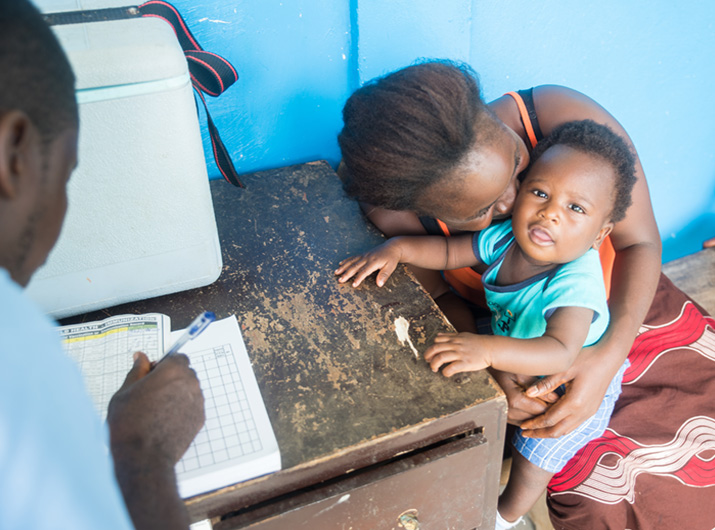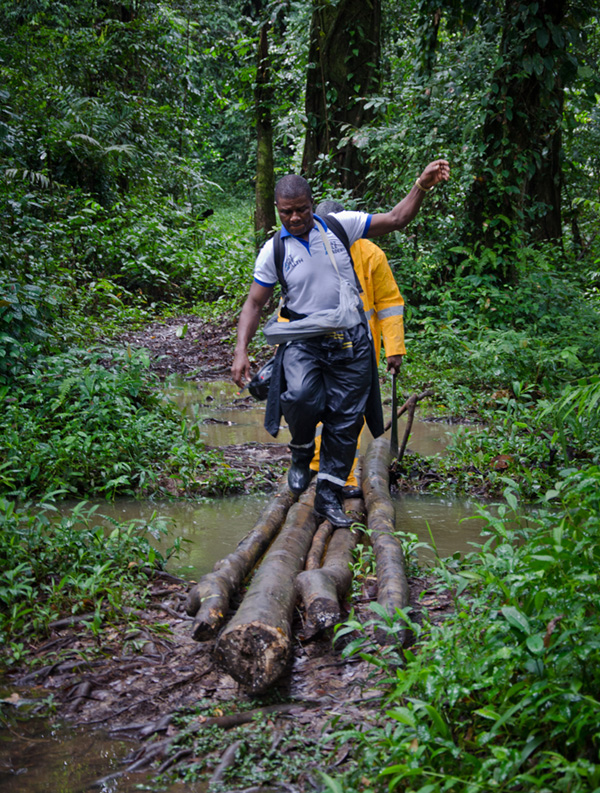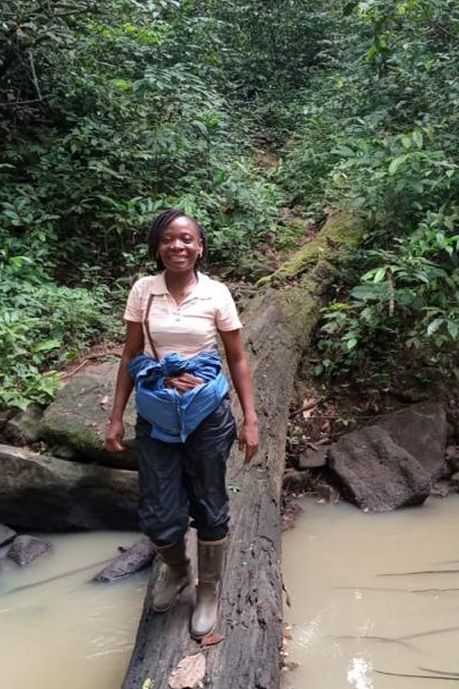Blog Post
“Putting every community on the map”: Geospatial mapping strengthens community health worker programs in Liberia and Sierra Leone
We are the longest-serving community health partner to Liberia’s Ministry of Health, working collaboratively to launch, scale, and sustain the country’s first-ever community health program to provide lifesaving care to more than one million people.
Liberia is one of the poorest countries in the world, and faced the daunting task of rebuilding the devastated health system after a decade of civil war and the 2014-2015 Ebola epidemic. Nearly 30% of its population of 5 million live in remote communities more than five kilometers from the nearest health facility. The journey to access care can take several hours or more, traveling by foot, canoe, or motorbike on narrow paths carved through the rainforest. Despite enormous progress in healthcare access, gaps contribute to ongoing challenges, especially for mothers and children: Liberia still has one of the highest maternal mortality rates globally, at 742 deaths per 100,000 live births.
Drawing on the demonstrated power of community health workers in the fight against Ebola, the Ministry of Health launched the National Community Health Program in 2016, the country’s first-ever paid community health worker program, with Last Mile Health as the leading partner in designing, launching, and scaling the program. The program has made tremendous progress: community health workers provide life-saving primary care to more than one million Liberians and treat 45% of malaria cases in children under age five in rural areas. When Liberia launched its first malaria vaccine in 2024, community health workers were integral to the Ministry of Health’s strategy, and today, they play a central role in community outreach, education, and patient tracking for this lifesaving intervention.
Building on nearly 20 years of partnership, we worked alongside the Ministry of Health to scale the National Community Health Program, and in June 2024, it reached full scale, with paid, professional community health workers serving every district in Liberia. Although the termination of USAID funding has reduced coverage in some counties, we continue to work alongside the Ministry to strengthen the program’s services and increase government ownership for long-term, full-scale sustainability. Liberia’s community health workforce has been recognized as a global exemplar, indicating its remarkable progress—and providing an invaluable blueprint for countries across the continent and beyond.
COMMUNITY AND FRONTLINE HEALTH WORKERS
currently served by Last Mile Health and the Ministry of Health
TREATMENTS DELIVERED TO CHILDREN UNDER FIVE
for malaria, diarrhea, and acute respiratory infection since 2016
ROUTINE HOME VISITS
provided by community health workers in Liberia since 2016
Our partnership with the Liberia Ministry of Health is the cornerstone of our work. Fueled by the belief that no patient should be out of reach, we launched Liberia’s first rural, public HIV treatment program, and then went on to partner with the Ministry and the Global Fund to replicate our HIV treatment model in 19 public clinics across 12 of Liberia’s 15 counties. But we learned early on that it wasn’t enough to make care accessible – we needed to bring care directly to patients living in last mile communities.
Together, we piloted the country’s first community health worker program in Konobo District in 2012 to provide primary health services door-to-door. Due to the success of our pilot, we worked with the Ministry to scale the model first county-wide and then nation-wide through the national program, which reached all 15 of Liberia’s counties as of June 2024. We’ve worked alongside the Ministry as a trusted partner at every step, providing technical expertise to design the national policy, launch governance systems, improve and roll-out standardized training, and bring in vital financing for the program.


Today, our work in Liberia focuses on scaling and strengthening the community health system while ensuring its workforce receives strong support through quality training and digital tools. We work directly alongside county health teams in Rivercess County, where we pilot innovations for expanded care, such as delivering new family planning options and launching the country’s first national malaria vaccine campaign. With the Ministry, we continue to serve as technical advisors, working to improve community health worker training by developing stronger curricula and assessments and serving as a key partner in scaling the electronic Community-Based Information System, which we began to pilot in 2023. Our shared work will close access gaps, expand services, and improve the standard of care. It also contributes to a more durable program over the long term, as the program has now been sustained across three presidential administrations.
While the impact of Liberia’s community health program is national, it is also personal—just ask Marie Gboto, who brought her son Samuel to community health worker Laura Gbee when Samuel woke up with a dangerous fever and vomiting. Recognizing the signs of malaria, Laura conducted a rapid diagnostic test on Samuel, and when it showed a positive result, she prescribed appropriate treatment, administering the first dose and describing follow-up care. Today, Samuel is healthy and happy: Laura’s work turned a fatal disease into a treatable one. Together with Liberia’s Ministry of Health and community health workers like Laura, we are committed to bringing care within reach to make this the reality for all Liberians.
COMMUNITY HEALTH WORKER SPOTLIGHT
When you work in community health, what you are doing has a positive impact in your community. Deaths from diarrhea are reduced. People are not walking two or three hours just to treat malaria. Women are planning their families. It’s really changing the lives of our people.”
– PILLAR NUFEPOLU
A community health supervisor in Grand Bassa County, Liberia

Blog Post
“Putting every community on the map”: Geospatial mapping strengthens community health worker programs in Liberia and Sierra Leone
Blog Post
"Our children are getting their vaccines now": Liberia's community health workers connect families to malaria vaccines
Blog Post
“My community has been uplifted”: A profile of community health worker Victoria Karpay
To bring a health worker within reach of everyone, everywhere.
SUPPORT OUR WORK >